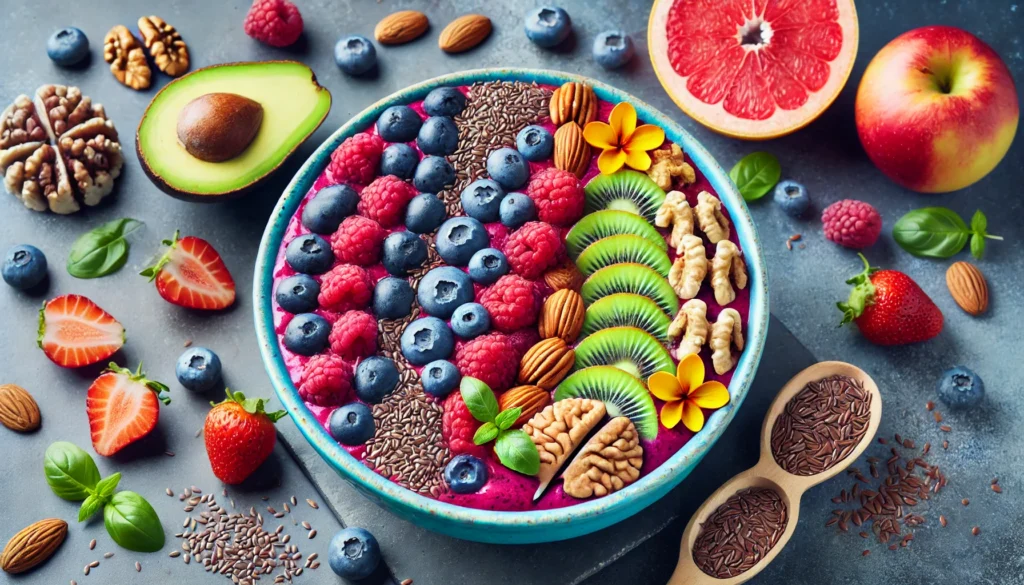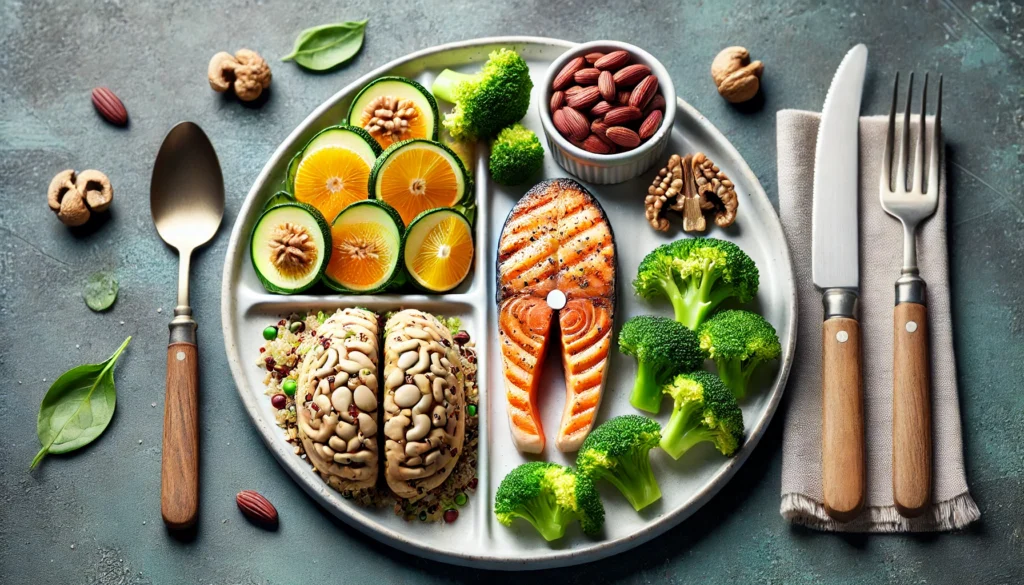In this article, we will delve into the top 10 foods that combat dementia, explore their benefits, and discuss the scientific evidence supporting their impact on brain health. Our exploration will highlight the power of nutrition in promoting brain health, offer insights into how specific foods can be integrated into daily meals, and provide guidance on maintaining cognitive function through diet.
You may also like: Memory-Boosting Foods You Should Try Today
Understanding Dementia and Diet
What is Dementia?
Dementia is a general term for a decline in cognitive ability severe enough to interfere with daily life. It’s not a single disease but a syndrome characterized by a set of symptoms that may include memory loss, confusion, and changes in personality. Alzheimer’s disease is the most common cause of dementia, but it is not the only one. Vascular dementia, Lewy body dementia, and frontotemporal disorders are among the other types. These conditions differ in their pathologies and symptom progression, yet share the commonality of debilitating cognitive decline.
The Role of Diet in Brain Health
The connection between diet and brain health is a burgeoning area of research. Although no single food can prevent dementia, certain dietary patterns have been linked to a reduced risk of cognitive decline. The Mediterranean diet, for instance, rich in fruits, vegetables, whole grains, and healthy fats, has shown promise in maintaining cognitive function. Adopting such diets can help reduce inflammation, improve vascular health, and provide antioxidants that protect brain cells from damage.
Nutritional Neuroscience: A Growing Field
Nutritional neuroscience is the study of how nutrients influence brain function and mental health. This field has gained traction as researchers uncover the complex interactions between diet and brain health. Studies have shown that diets high in saturated fats and sugars may negatively impact brain function, while those rich in omega-3 fatty acids and antioxidants support cognitive health. As this field grows, it offers exciting possibilities for dietary interventions in cognitive health maintenance.
The Top 10 Foods to Combat Dementia
1. Leafy Greens
Leafy greens like spinach, kale, and Swiss chard are packed with brain-boosting nutrients. Rich in vitamin K, lutein, folate, and beta carotene, these greens have been associated with slower cognitive decline. A study published in the journal Neurology found that individuals who consumed one to two servings of leafy greens daily had the cognitive abilities of someone 11 years younger than those who consumed none.
Incorporating leafy greens into your diet can be simple. Add them to salads, smoothies, or stir-fries to enjoy their brain-boosting benefits. These versatile ingredients not only support cognitive health but also contribute to overall wellness with their high nutrient density.
To maximize the benefits, consider pairing leafy greens with healthy fats like olive oil, which can enhance the absorption of fat-soluble vitamins and antioxidants.
2. Berries
Berries, particularly blueberries and strawberries, are rich in antioxidants known as flavonoids. These compounds have been shown to improve memory and cognitive function by reducing inflammation and oxidative stress in the brain. A long-term study from the Annals of Neurology found that women who consumed more berries had delayed cognitive aging by up to 2.5 years.
Berries are not only delicious but also incredibly versatile. They can be enjoyed fresh, frozen, or dried, making them easy to incorporate into a variety of dishes. Add them to your breakfast cereal, yogurt, or enjoy them as a snack.
Regular consumption of berries may help maintain cognitive sharpness and protect against age-related decline. Their potent antioxidant properties make them a valuable addition to any brain-healthy diet.
3. Nuts
Nuts, particularly walnuts, are excellent sources of omega-3 fatty acids and antioxidants, which are crucial for brain health. A study in the Journal of Nutrition, Health & Aging suggests that consuming nuts regularly can improve cognitive function. Walnuts, with their high DHA content, are particularly beneficial for maintaining brain health.
Incorporating nuts into your diet can be both tasty and convenient. They make for a great snack on their own or can be added to salads, oatmeal, or baked goods for a nutritious boost.
Variety is key; try to include different types of nuts like almonds, pistachios, and hazelnuts to enjoy a broad range of nutrients. Moderation is also important, as nuts are calorie-dense, so a small handful a day is sufficient to reap their benefits.
4. Fatty Fish
Fatty fish such as salmon, mackerel, and sardines are rich in omega-3 fatty acids, vital for brain function. These healthy fats can help reduce beta-amyloid levels, a protein involved in the formation of harmful brain plaques in Alzheimer’s disease. The American Journal of Clinical Nutrition has highlighted the positive effects of omega-3s on cognitive performance and brain structure.
Incorporating fatty fish into your diet a few times a week can be beneficial for brain health. Grilling, baking, or steaming are healthy cooking methods that preserve the beneficial fats in these fish.
For those who do not consume fish, omega-3 supplements derived from algae offer a plant-based alternative. Consistent intake of omega-3s is key to supporting cognitive function and protecting against neurological decline.
5. Whole Grains
Whole grains, including oats, barley, and quinoa, provide essential energy to the brain in the form of glucose. Rich in fiber, they help regulate blood sugar levels, preventing spikes that could impact cognitive function. Research from the British Journal of Nutrition indicates that whole grains may play a role in maintaining cognitive health.
Incorporating whole grains into meals is simple and can include swapping refined grains for whole grain alternatives in bread, pasta, and rice.
These grains offer sustained energy release, which is essential for maintaining focus and mental clarity throughout the day. By including a variety of whole grains in your diet, you can ensure a diverse intake of nutrients that support overall brain function.

6. Olive Oil
Olive oil, especially extra-virgin olive oil, is a staple of the Mediterranean diet and is associated with numerous health benefits. Its anti-inflammatory properties and high content of antioxidants support brain health. A study in the Annals of Clinical and Translational Neurology suggests that olive oil may help protect against cognitive decline.
Using olive oil as your primary cooking oil is an effective way to incorporate its benefits into your diet. It can be used in salad dressings, marinades, and for sautéing vegetables or proteins.
For maximum health benefits, choose high-quality, extra-virgin olive oil, which retains the most antioxidants and phytonutrients. Regular consumption of olive oil can contribute to a diet that supports long-term brain health.
7. Turmeric
Turmeric contains curcumin, a compound known for its anti-inflammatory and antioxidant properties. Curcumin can cross the blood-brain barrier, making it a potential therapeutic agent for brain health. Research in the Journal of Alzheimer’s Disease found that curcumin may help improve memory and mood in those with mild cognitive impairment.
Incorporating turmeric into your diet can be done through adding it to curries, soups, or smoothies. It pairs well with black pepper, which enhances curcumin absorption in the body.
Turmeric’s vibrant color and flavor make it a versatile spice that can enliven a variety of dishes. Regular consumption may help support cognitive function and offer protective benefits against neurological decline.
8. Tomatoes
Tomatoes are rich in lycopene, a powerful antioxidant that may help protect against the cell damage associated with dementia. A study published in the Journal of Nutrition suggests that lycopene may help inhibit the progression of dementia by reducing oxidative stress and inflammation.
Incorporating tomatoes into your diet is easy due to their versatility. They can be enjoyed raw in salads, cooked in sauces, or roasted as a side dish.
Pairing tomatoes with healthy fats, such as those found in olive oil or avocado, can enhance lycopene absorption. Regular consumption of tomatoes can contribute to a diet that supports brain health and protects against cognitive decline.
9. Dark Chocolate
Dark chocolate, with at least 70% cocoa, is an excellent source of flavonoids, caffeine, and theobromine. These compounds may enhance memory, improve mood, and reduce cognitive decline. A study in the Journal of Alzheimer’s Disease noted that regular consumption of dark chocolate could enhance cognitive performance.
Enjoying dark chocolate in moderation can be a delicious way to support brain health. Opt for high-quality chocolate with minimal added sugars to maximize its benefits.
Dark chocolate can be consumed on its own, or used in baking and cooking to add a rich flavor to desserts and dishes. Its unique combination of nutrients makes it a pleasurable addition to a brain-healthy diet.
10. Beans
Beans are rich in fiber, antioxidants, and B vitamins, which are essential for brain health. They provide a steady supply of glucose to the brain, supporting cognitive function. The American Journal of Clinical Nutrition emphasizes the importance of beans in reducing the risk of cognitive decline.
Incorporating beans into meals is simple and can include adding them to salads, soups, or as a side dish. Their versatility makes them a staple in many cuisines, providing both flavor and nutrition.
By including a variety of beans in your diet, you can ensure a diverse intake of nutrients that support brain health. Regular consumption can help maintain cognitive function and protect against age-related decline.

Foods to Avoid: Protecting Your Brain
Processed Foods and Brain Health
While incorporating brain-healthy foods is crucial, it’s equally important to be mindful of foods that may harm cognitive health. Processed foods, often high in unhealthy fats, sugars, and additives, have been linked to an increased risk of dementia. These foods can contribute to inflammation and oxidative stress, which negatively impact brain function.
The Impact of Sugar on Cognition
High sugar intake is associated with impaired memory and learning abilities. Excessive sugar consumption can lead to insulin resistance, which has been linked to cognitive decline. Reducing sugar intake and choosing natural sweeteners can support better brain health.
Alcohol and Cognitive Decline
Excessive alcohol consumption is another dietary factor linked to an increased risk of dementia. Alcohol can damage brain cells and impair cognitive function. Moderation is key, and opting for low-alcohol or alcohol-free options can help protect brain health.
The Future of Diet and Dementia
Emerging Research in Nutritional Neuroscience
The field of nutritional neuroscience is rapidly evolving, with new studies continually emerging. Researchers are exploring how specific nutrients and dietary patterns can influence brain function and prevent cognitive decline. This growing body of evidence is helping to uncover the potential of diet as a tool for maintaining cognitive health.
Personalized Nutrition for Brain Health
As research progresses, the concept of personalized nutrition is gaining attention. This approach considers individual differences in genetics, lifestyle, and health status to tailor dietary recommendations. Personalized nutrition may offer more effective strategies for preventing dementia and supporting brain health.
The Role of Public Health Initiatives
Public health initiatives are increasingly focusing on the importance of diet in cognitive health. Educational campaigns, policy changes, and community programs aim to raise awareness about the impact of nutrition on brain health. These efforts play a crucial role in promoting healthier eating habits and reducing the risk of dementia.
Conclusion: Crafting Your Dementia Prevention Diet
Incorporating these top 10 foods into your diet is a practical step toward supporting brain health and potentially reducing the risk of dementia. While no single food is a magic bullet, a balanced diet rich in these nutrients, alongside a healthy lifestyle, can contribute significantly to cognitive well-being.
Making Mindful Food Choices
Stay informed, make mindful food choices, and nourish your brain for a brighter, healthier future. Consider planning meals that include a variety of brain-boosting foods to ensure a diverse intake of nutrients.
Lifestyle Factors and Cognitive Health
In addition to diet, other lifestyle factors such as regular exercise, adequate sleep, and mental stimulation are crucial for maintaining cognitive health. Combining these elements with a nutritious diet can create a comprehensive approach to dementia prevention.

The Journey Toward Cognitive Vitality
Crafting a diet that supports brain health is an ongoing journey. Continually seek out new information, experiment with different foods, and prioritize your cognitive well-being. By doing so, you can take proactive steps to protect your brain and enhance your quality of life.
Further Reading:
Lifestyle changes can help prevent dementia
Brain-healthy tips to reduce your risk of dementia
Reduce dementia risk with these food and activity choices | CNN
Important Note: The information contained in this article is for general informational purposes only, and should not be construed as health or medical advice, nor is it intended to diagnose, prevent, treat, or cure any disease or health condition. Before embarking on any diet, fitness regimen, or program of nutritional supplementation, it is advisable to consult your healthcare professional in order to determine its safety and probable efficacy in terms of your individual state of health.
Regarding Nutritional Supplements Or Other Non-Prescription Health Products: If any nutritional supplements or other non-prescription health products are mentioned in the foregoing article, any claims or statements made about them have not been evaluated by the U.S. Food and Drug Administration, and such nutritional supplements or other health products are not intended to diagnose, treat, cure, or prevent any disease.


